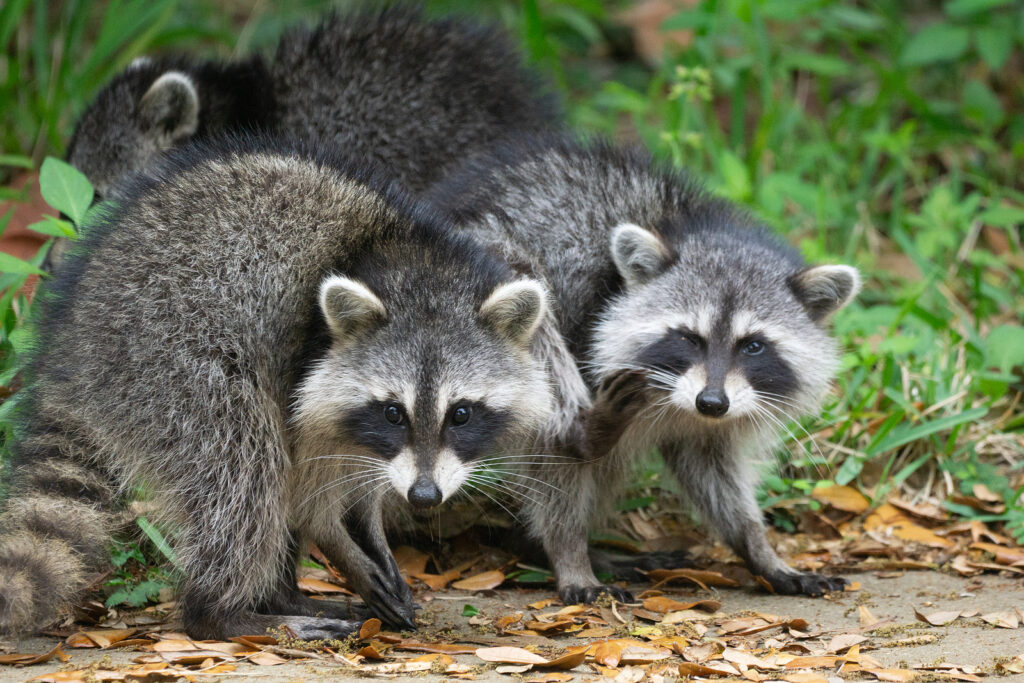Raccoons are unlike any woodland mammal here in Indiana. There is a reason why they are one of the most common nuisance critters in the state among both residential and commercial property owners. It is important to protect your property from nuisance raccoon activity and tampering if you want to preserve the structural integrity and safety of your investment.
Furthermore, raccoons are known carriers of several transmissible diseases and undesirable contagions like lice and mites. Perhaps by learning more about typical raccoon behavior, you can more clearly recognize why raccoons are attracted to your property and how they are capable of causing so much destruction.
Continue reading to learn what raccoons like to do in order to understand how to get rid of them for good in the safest manner possible.

Typical Raccoon Behaviors
Raccoons are very intelligent, demonstrating human-like characteristics of curiosity and problem solving. But this is not learned behavior; instead, raccoons are bred with these types of qualities, traits, and natural behaviors. Below are some principal aspects of a raccoon’s life, and what behaviors they display in each.
Fundamental Facts About Raccoons:
🦝► Raccoon Reproduction
Raccoons conceive in wintertime, usually later in the season. This way, their pups are born in the spring, when weather is warm, and the survival-rate is much higher. They hide away and hibernate in warm dens or shelters through the winter but remain active in all other seasons. Mothers generally reproduce one to six baby raccoons, on average. They are extremely protective of their offspring as well. Most raccoon attacks reported have been from instigating or scaring a mother raccoon typing to protect her young.
🦝► Raccoon Social Habits
Once raccoons are 12 months old, they are no longer attached to their mother. They flee the coup, so to say, and become entirely independent. Although independent, raccoons remain in groups, up to five or six at a time, for protection against natural predators, and perhaps even companionship (although not proven). To communicate to one another, raccoons have a language of more than 200 sounds and 12 calls.
🦝► Raccoon Activity
Raccoons are nocturnal, so they rest in the day and then hint for food at night. They eat everything from fruit and nuts to small prey, fish, lizards, birds, and more. They are particularly fond of human food, which is why they tend to raid garbage cans on occasion. Because of over-development, these mammals have lost a lot of their natural habitat and are forced into our residential and urban areas for food and shelter. And for this reason, they are often deemed a nuisance animal in these areas. But not in the wild!
🦝► Raccoon Abilities
Raccoons are not just very intelligent and exhibit curiosity and memory just as humans do, they are also quite good with their hands. Their paws are hyper-sensitive to touch, and also very agile and dexterous. They have human-like hands that allow them to grasp, clutch, hold, pry open, climb, and much more. They can undo latches, locks, doorknobs, and more if the opportunity arises.
Are you interested in animal-proofing your property to get rid of raccoons and other unwanted critters? If so, you are the right place! Contact Modern Wildlife Control at 317-847-6409 for safe and effective animal trapping and removal services for raccoons and more. We serve residential and commercial clients in Indianapolis and all throughout Central Indiana.
Related Posts:
Standard Procedures and Prices for Raccoon Removal
Learn Why Nuisance Animals are Attracted to Your Property
How to Spot the Signs of Raccoons Around Your House

